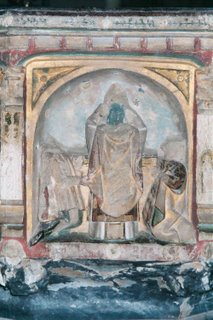
Shown: a panel of a Baptismal font that is one of the Seven Sacraments series. Each of the seven sides depicts a Sacrament.
I never knew that the Jews prayed facing East until someone recently told me. I had known that the Muslims did. Strange isn't it that the three major religions all have it within their Traditions to face East in prayer. Except for the Novus Ordo priest during Mass.
How very unecumenical of him.
From an Adoremus article on Facing East:
History of "Liturgical East"
Why the insistence on an Eastward-facing position for both priest and congregation? From early on, Christians adopted the Jewish practice of praying toward Eden, in the East (Gen. 2:8), the direction from which Ezekiel saw come "the glory of the God of Israel" (Ezek 43:2,4), the direction in which Jesus ascended from the Mount of Olives and wherefrom He will return (Acts 1:11), and the direction whence the Angel of the Lord will come in the end time (Rev. 7:2). Tertullian informs us that Christian churches are "always" oriented "toward the light".
Origen asserts that the direction of the rising sun obviously indicates that we ought to pray inclining in that direction, an act which symbolizes the soul looking toward the rising of the true light, the Sun of Justice, Jesus Christ.
Saint John Damascene says that, while waiting the coming of the Lord, "we adore Him facing East", for that is the tradition passed down to us from the Apostles. Other Church Fathers who confirm this usage are Clement of Alexandria, Saint Basil and Saint Augustine. To this day, the ancient Coptic Rite of Egypt retains in its eucharistic liturgy (just before the Sursum corda) the age-old exhortation of the deacon: "Look towards the East!"
In The Reform of the Roman Rite (San Juan Capistrano, Calif.: Una Voce Press; Harrison, N.Y.: Roman Catholic Books, 1993, chaps. XII-XV), the late Monsignor Klaus Gamber, director of the Regensburg Liturgical Institute, demonstrates convincingly that the precedents for freestanding altars with Mass "facing the people" have been highly exaggerated. In agreement with such eminent (and unquestionably orthodox) liturgists as Father Josef A. Jungmann and Father Louis Bouyer, Gamber shows that the practice of celebrating the Eucharist versus populum flourished only in the city of Rome and in parts of North Africa, where the pagan custom of having the façade (rather than the apse) of a temple facing East was continued; but even then, the historical evidence shows that, while the celebrant did in fact face the people, they did not face him, but turned their backs on him during the prayers so that they, too, could face East.
The whole article can be read here. Written by Fr. Thomas Kocik, a priest of the Fall River diocese in Massachusetts, who from what I understand, is forbidden to say the Latin Mass at the Indult located just a few miles away from his parish.

4 comments:
There was a lovely and pious custom in many parts of Europe (you know, back when it was actually Catholic), which had the bodies of the faithful buried facing East; so that at the coming of Christ, their body/souls, being once more reunited by the power of Our Lord Who has won for us the resurrection, might thereby be more easily able to greet Him.
The only exception, and really the only time when the Priest "faced" the people in this joint recognition of the importance of the East (outside of those parts of the Mass wherein he does so in order to speak to the Faithful) was to have the body of the Priest facing West. Why?
So that at the General Resurrection of us all, the Priest, acting in his ministerial capacity *in persona Christi*, and sharing in the eternal Priesthood of Our Lord, even as He Himself returns, might arise to see that all of the flock which was intrusted to his care will be present and ready to greet Him as He comes.
A truly lovely and poignant custom, no?
Do the Muslims face east or do they just face Mecca? I think this is the case.
If they were in Indonesia they'd be facing West.
Just a couple points of clarification. The "indult Mass" in the Diocese of Fall River, Massachusetts, is celebrated in Holy Redeemer Parish, at the chapel of Our Lady of Grace, in Chatham (on Cape Cod). I was not forbidden to celebrate the indult Mass there; rather, when I expressed to the bishop my willingness to do so, I was told that another priest (retired) had been asked to do so; he resides in the parish. Also, Chatham is not just "a few miles" from me; I am in Fall River (the see city), which is more than an hour's drive.
I smiled at the March 13 entry where it said, "Fr. Thomas Kocik" is forbidden to say the Latin Mass at the Indult located just a few miles away from his parish. As the Associate Pastor of the Indult parish myself in my own Archdiocese, I was expressly forbidden in writing by my ordinary from offering the Tridentine Mass. Thank heavens Pope Benedict freed it up for the whole world now, I'm happy to have offered it twenty times by now. Wow, what a difference! Wow, what we have lost! I hope a change comes, and, finally admitting the obvious failure of the Novus Ordo, the Pope and Bishops simply return to the 1962 Missal and prohibit the Novus Ordo to the same measure they squashed the Tridentine Mass.
Post a Comment